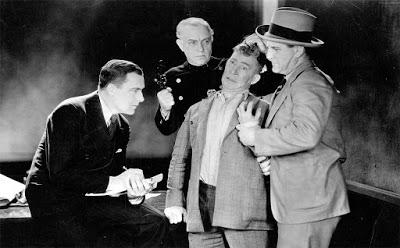Format: Internet video on The Nook.

I try to keep things loose as much as I can with what movies I watch. What I mean by that is that I try to be varied in terms of what nominations I’m looking at and what decade I select from. I don’t want to watch a string of films from the same couple of years one after the other in general. If I’m honest, though, I’m pretty lax on watching things from the earliest years of my Oscar categories. It’s been ages since I’ve seen something from the ‘20s. Part of the reason is that quality can be a real issue. Part of it is that of the movies that are missing, lost, or unavailable are pretty heavily concentrated in those first few years. Regardless, I came across Alibi online today, so I figured I may as well knock it out.
Where Alibi is kind of interesting in terms of early talkies is that we don’t really have a main character. Well, we kind of do; we have Chick Williams (Chester Morris), who has just been released from prison. Chick protests his innocence, even though he probably was guilty. Now that he’s out, he’s ready to get back into his crime life, and he’s more than ready to cover himself as much as he can. He’s got an in; he has the romantic interest of Daisy Thomas (Mae Busch), who happens to be the daughter of the local police chief.
Soon enough, Chick does get back into the life and shoots a police officer, but he’s got himself covered. He pulled off the crime during the intermission of a show he attended with Daisy, giving him the perfect alibi. The police naturally want the crime solved and do everything they can to find the guilty party, including bringing in a stooge from Chick’s gang and literally threatening to kill him and cover it up as a failed escape attempt. He blabs that Chick pulled the trigger, but Chick has the problematic alibi. Worse, in the ensuing days, he’s married Daisy, meaning she can’t testify against him.
What Chick doesn’t know is that the drunk he hangs around with is actually an undercover cop. When it’s suggested that this alleged drunk be used to cover the five-minute gap in Chick’s alibi, the police know they have their man, and it all comes down to closing in on him and getting him to confess.
And that’s pretty much it for Alibi. It couldn’t be simpler. A guy commits a crime and creates what he thinks is an air-tight alibi. In fact, the police figure out that he did have the opportunity to commit the crime and they do everything they can to get the guilty man behind bars. The end.
I can imagine that Alibi worked pretty well for audiences in 1929. There are some interesting things done with sound in the opening moments of the film, for instance, and like virtually every early talkie, parts of the film take place in a nightclub so that there’s a chance for singing and dancing. And, while the plot is incredibly simplistic, the novelty of sound was such that audiences of the time were so focused on that that the plot didn’t need to be that exceptional. All it really had to do was hang together and make sense, and Alibi is so simple that it almost can’t help doing that.
The problem is that it’s not very good. Oh, it’s not the worst movie I’ve ever seen and it’s not even the worst crime movie I’ve ever seen. But it really isn’t very interesting because it is so basic and so easy to follow. We know where this is going from the very start. Really, the only interesting thing here is that Chick Williams is completely unsympathetic. We want this guy to get busted. That’s not a common thing for an early film where, when the villain was the main character, we’re at least given the opportunity to understand that character and even feel sorry for him. Not here. Then again, we don’t really have a reason to care about the police, either.
I can’t call this a great film, or even a good one. It’s mildly interesting only because of when it was made and the early experiments with using sound as more than just sound. But really, Alibi was so uninteresting that I’m out of things to say a good 100-200 words short of what I normally write.
Why to watch Alibi: An interesting early crime film.
Why not to watch: Like a lot of early talkies, it’s overplayed.
